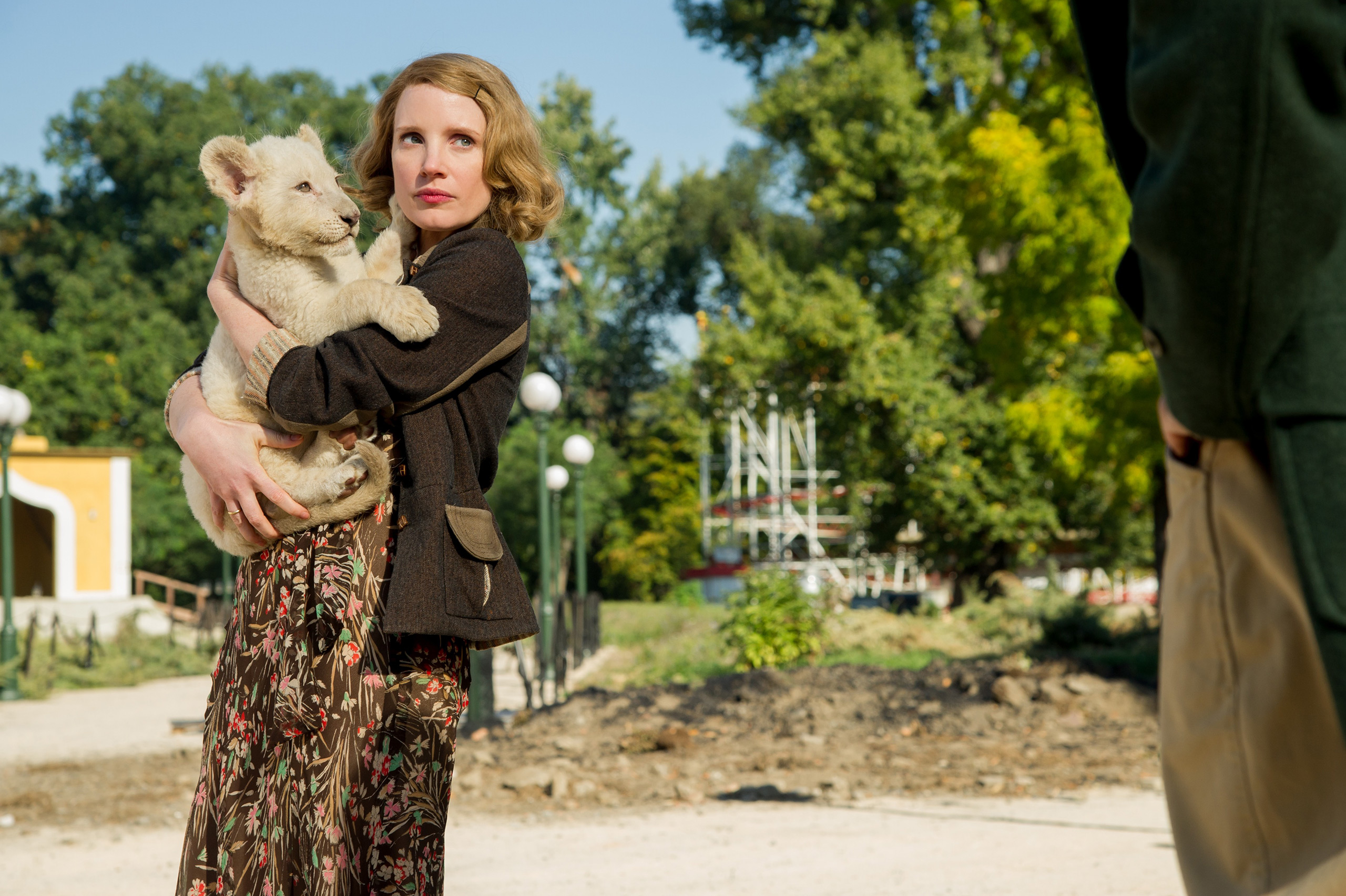The primary reason to see The Zookeeper’s Wife—and it’s a good one—is a moving performance from Jessica Chastain as real-life World War II heroine Antonina Zabinska, proprietor of the Warsaw Zoo and savior of more than 300 Jews rescued from the Warsaw Ghetto and hidden in her basement while Nazis infiltrated her home.
For this affecting film, Chastain, a near-perfect amalgam of method technique and movie star charisma, worked to learn piano and adopt a Polish by way of Russia accent, calling to mind Meryl Streep’s legendary performance in Sophie’s Choice. This is not to suggest that Caro’s picture is in that league—it isn’t—but Chastain’s work impresses in a movie with enough conviction to overcome what sometimes feel like familiar elements.
A largely unknown chapter of World War II history, Diane Ackerman’s 2007 book of the same name was based on Antonina Zabinska’s memoirs, a tale of goodness and courage and doing the right thing in an unlikely place and time, at great personal risk. As directed by Caro, The Zookeeper’s Wife is a film that is universal in theme but quite specific in its depiction of a female-centric protagonist leading its underground railroad.
Picture opens in 1939 Warsaw on the eve of the Nazi invasion, with Antonina and Jan (Johan Heldenbergh) Zabinska sensing rising political pressures—German and Russia on each side—outside their tranquil sanctuary. The animals are, as expected, gorgeous, benevolent creatures of an Eden of sorts, and the opening third of the film is bathed in a glossy sheen, enchanting even, a picture-perfect depiction of a sanctuary about to be upended.
Dubbed the “animal whisperer” for her uncanny gift of communication and empathy, Antonina actually prefers the zoo’s denizens to people, finding them more emotionally transparent and authentic; the feeling seems to be mutual.
Lion cubs are siblings to son Rys (Val Maloku) while camels engage in morning runs alongside Antonina’s bicycle, her natural gift for understanding them depicted in an a scene where her favorite elephant’s birth goes awry. Antonina steps in, nurses the newborn to life and Atonina, covered in mucous, dirt and animal blood, inspires her fascinated dinner party guests.
She also inspires the couple’s German friend, Lutz Heck (Daniel Bruhl), Hitler’s chief zoologist, who brushes off inquiries about fascism. Of course, this turns out to be a lie and when Warsaw is invaded, the melee comes directly to the zoo, decimated by bombs, animals blown to smithereens, cruelly executed or stolen for pure breeding back in Berlin.
Jan initially hesitates when Antonina suggests hiding best friend Magda Gross (Efrat Dor) in a tiny closet. But once the Warsaw Ghetto is established and the Nazi intentions are clear, he orchestrates a dangerous smuggling scheme to get Jews out of the Ghetto and into hiding. The scheme effectively brings dozens into their makeshift community mere feet from danger in the crosshairs of constant, unannounced visits from Hecht.
It’s here that the film presents an interesting subplot, toying with Hecht’s increasing attraction to Antonina and her ability to stave this off, and the fissures it causes in the Zabinska’s marriage. Bruhl, the terrific star of Ron Howard’s 2013 car racing manifesto Rush, does his best to humanize Hecht, a herculean task given the character’s obvious moral culpability and unsavory alliances.
Angela Workman’s screenplay is mostly focused on the dynamics of the Zabinskas relationship and mechanics of navigating danger, offering little in the way of textured Jewish characters, presented here as merely sympathetic but interchangeable. One exception, a traumatized teen (Shira Haas) that has been sexually assaulted, becomes kindred spirits with Antonina, herself a refugee from a troubled childhood in St. Petersburg.
The Zookeeper’s Wife is about as handsome and enjoyable a movie that can be made from such grim events, and director Caro has stated that she wasn’t interested in making a war picture, per se, but rather a human one. She succeeds on this front, greatly aided by Chastain and Flemish actor Heldenbergh (The Broken Circle Breakdown) who wears his emotions on his sleeve.
If there is still any doubt, there are two scenes in the final 15 minutes of the picture that confirm Chastain as the premiere actress of her generation. One is a complicated negotiation with Bruhl where the actress appeals first to his sense of loyalty to their friendship (missing), then to his empathy (he has none) and finally, to his sense of exploitation (it works). The actress navigates the beats and reversals of the interaction with a series of detail-rich gestures of hope, disappointment, fear and revulsion. There is a high degree of manner to what she is doing, Streep-like in execution but quite original in its tremulous emotional release. The second scene couldn’t be simpler as, locked away and powerless to intervene, she imagines the fate of her child.
The Zookeeper’s Wife is a sum-of-its-parts picture, one that gives us gorgeous animals, a great star, an important subject, superb production values and a distinctly female point-of-view to potent material. For all its merits, it doesn’t quite leave one spellbound like Schindler’s List; few films can. But it is nonetheless a story that needs to be told. Whether the film works for you will come down to how familiar it feels, not quite a fair barometer given the magnitude of the subject and importance of remembrance.



